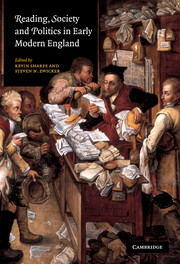Book contents
- Frontmatter
- Contents
- List of illustrations
- List of contributors
- Acknowledgements
- Introduction: discovering the Renaissance reader
- Part I THE MATERIAL TEXT
- Part 2 READING AS POLITICS
- 3 ‘Boasting of silence’: women readers in a patriarchal state
- 4 Reading revelations: prophecy, hermeneutics and politics in early modern Britain
- Part 3 PRINT, POLITICS AND PERFORMANCE
- Part 4 READING PHYSIOLOGIES
- Part 5 READING IN THE TIME
- Index
3 - ‘Boasting of silence’: women readers in a patriarchal state
Published online by Cambridge University Press: 22 September 2009
- Frontmatter
- Contents
- List of illustrations
- List of contributors
- Acknowledgements
- Introduction: discovering the Renaissance reader
- Part I THE MATERIAL TEXT
- Part 2 READING AS POLITICS
- 3 ‘Boasting of silence’: women readers in a patriarchal state
- 4 Reading revelations: prophecy, hermeneutics and politics in early modern Britain
- Part 3 PRINT, POLITICS AND PERFORMANCE
- Part 4 READING PHYSIOLOGIES
- Part 5 READING IN THE TIME
- Index
Summary
A late sixteenth-century treatise on marriage prescribes each spouse's role in a harmonious household: ‘The dutie of the man is, to bee skillfull in talke: and of the wife, to boast of silence.’ Taking this oxymoronic ideal of displayed silence as emblematic, this essay examines the silence of early modern women readers – both literal and figurative, prescribed and performed. Certainly, reading in late medieval and early modern England was as often public and social as it was private and silent, and gentlewomen's reading, in particular, frequently took an oral form. Women's experiences as readers, however, were nevertheless circumscribed by legal and cultural injunctions for silence. For women's reading, like women's writing and speaking, aroused controversy and attracted comment throughout the period, and the pressures of the patriarchal state on female readers can be felt in legal statutes, educational practices and conduct books. While legal and institutional practices demonstrate the workings of a partriarchal state, early modern conduct books reveal the assumptions of patriarchy in its ‘domestic form’, which Kathleen Brown defines as the ‘historically specific authority of the father over his household’. This essay considers three prescribed forms of female readerly silence – restraint from public reading, limitations on linguistic proficiency and abstention from vocal criticism – as the context for women's habitual silence in the margins of their books.
- Type
- Chapter
- Information
- Reading, Society and Politics in Early Modern England , pp. 101 - 121Publisher: Cambridge University PressPrint publication year: 2003
- 2
- Cited by



